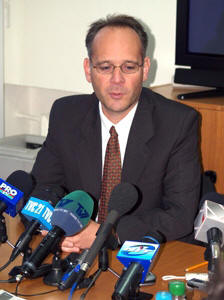|

MOLDOVA HAS THE REQUIRED POTENTIAL FOR ATTRACTING INVESTMENTS IN ALL SECTORS
OF THE ECONOMY
Business Expert Magazine:
Interview with Johan Mathisen, IMF Resident Representative in Moldova
1.
What’s your opinion about the developments in Moldovan economy
throughout 2007? Which were the most notable trends, in your view?
As you are aware, the IMF is an institutions that mainly
focuses in its activity on macroeconomic developments. We have concluded that in
2007 appropriate monetary and fiscal policies were promoted. We think that
public finances are good, the 2008 budget is appropriate, and NBM has set
disinflation as its main goal. Growth has resisted remarkably well in face of
successive economic shocks that had had an impact on the national economy: the
wine ban, the doubling of energy prices, and drought. There are very few states
that can show positive growth when dealing with such shocks.

We are witnesses that once the wine ban was lifted and a
very advantageous agreement was signed with the EU the outlook is very positive
and there is opportunity to speed up reform implementation. We think that in the
future focus will be placed on promoting ongoing growth fuelled by private
sector development supported by a modernized public administration. There is
still the risk of maintaining high inflation once the credit and monetary base
grow.
In general, Moldova feces issues characteristic of all
states in transition: massive capital inflows, inevitable currency appreciation,
but these are the reflection of better investment opportunities than in other
states. Also, due to the appreciation of the national currency income will
increase to increasingly converge with that in other states. We do not assess
Moldova as a small income country fuelled mostly by remittances any more, but
rather believe that this state is in its early stages of transition.
Indeed, the financial sector is underdeveloped, financial
intermediation and crediting levels are low, and the share of population
holding bank accounts remains very low. Therefore, in the IMF program stress was
placed on strengthening the financial market structure, including by
establishing the National Financial Market Commission.
If we study the EBRD Transition report, the World Banks
Doing Business report, or the competitiveness ranking of the World Economic
Forum, we will see that the business environment in Moldova still remains weak.
We have taken note of some positive initiatives of the Government such as the
Guillotine process. We are pleased that Government has undertaken an ambitious
privatization program. Indeed, the list of structural reforms is overwhelming.
In this context, we were disappointed by the recent
development related to the heating service provision, which distract the
authorities’ attention from undertaking other important actions. In the end, the
undermining of the financial viability of the companies in this sector will
benefit no one.
To conclude, in general, the Moldovan economy status is
positive. There are correct macroeconomic policies in place. Certainly, the list
for necessary structural reforms is very long there is a lot to be done.
However, the beginning at least is a good one.
2.
Which were the three most important economic events in Moldova in
2007?
In our opinion, Moldovan economy was most marked in 2007 by
(1) the banning and, eventually, (2) resuming wine export to Russia, as well as
by (3) the signing of the asymmetric trade preference agreement with the
European Union.
3.
How do you expect Moldova economy to develop in 2008? What are your
projections? Which areas do you expect to have most growth and investment
attraction potential in 2008?
We are optimistic about the macroeconomic parameters
evolution in 2008. We think that inflation will be in the one-digit area and
growth will be at least 7 per cent.
Moldova needs and has the necessary potential to attract
investment in all sectors of economy. We anticipate the trend of FDI supply on
the local market will continue, some of these being aimed to benefit from the
autonomous trade preferences with the EU. Also, we expect local and foreign
direct investment to be more and more channeled to the service sector.
4.
What are the IMF’s expectations for the development of Moldovan
economy in 2008?
From the fiscal viewpoint, we believe that prudent policy
will continue to be promoted and the deficit threshold of 0.5 per cent of GDP
will be maintained. We anticipate that tax revenues will continue to have a
positive trend, and budget expenditures will comply with the Program provisions,
including the one on implementing a new social assistance system in September
next year.
It will be necessary that monetary policy remains tight, to
ensure disinflation and to resist pressure stemming from capital inflows that
are increasingly channeled towards investments in Moldovan economy.
|